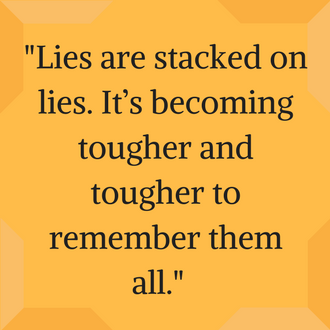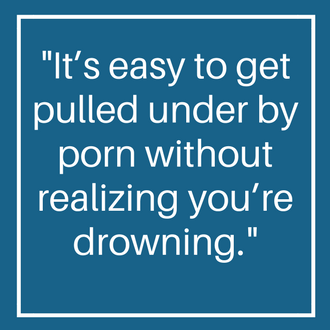Let the journey of self-discovery enrich your life...
[The struggle with pornography use isn’t the same for everyone. For some, it’s the frequency of use that overwhelms them. For others, the lying and secrecy around use takes a toll. Some don’t want to view porn but feel helpless to stop using it, while others feel burdened by guilt and shame for using porn.
What follows is an imagined scenario of problematic pornography use. You may not see yourself in everything that follows (and of course the particulars are fictionalized, so you likely won’t), but I encourage you to read through it and see if any aspect of what is described parallels the tone of or some aspect of your struggle.]
Is Pornography Problematic for You?
This past December was your company’s annual holiday party. You and your co-workers already know who’s going to drink too much, who’s going to complain about the catered food, who’s going to make a fool of themselves on the dance floor. But it’s all in fun and everyone seems to have a good time.
You’re really glad you went; making the party (and staying the whole time) is a milestone for you. A milestone of getting your life back on track.
Over the years you developed a reputation of not showing up for the party, or, if you did show, you always had an excuse to leave early. It’s not that you didn’t want to go. In fact, you’d always leave the house with the intention of going. And on two occasions you actually made it all the way to the venue’s parking lot before leaving.
And each time you didn’t go to the party, you drove somewhere else…usually (but not always) somewhere desolate, somewhere where you watched porn and masturbated. One time you arranged a meeting with an escort but you didn’t follow through. You sat in front of her address with your heart racing, trying to muster the courage, trying to block out the anxiety while holding on to the excitement that led you to call her.
 What’s most difficult about all this is the fact that you’ve had to lie to your wife when you returned home. First and most glaring, there’s the lie that spouses aren’t invited to the holiday extravaganza. Then, of course, there’s the lie about the party itself. So you tended to make up some stories to add landscaping to the lie (“Ed drank too much and couldn’t speak softer than a yell after that”; “Carla complained about every party detail the entire length of the party”; “Jason used the party to celebrate a promotion that nobody but Jason and the boss thinks he deserved”).
What’s most difficult about all this is the fact that you’ve had to lie to your wife when you returned home. First and most glaring, there’s the lie that spouses aren’t invited to the holiday extravaganza. Then, of course, there’s the lie about the party itself. So you tended to make up some stories to add landscaping to the lie (“Ed drank too much and couldn’t speak softer than a yell after that”; “Carla complained about every party detail the entire length of the party”; “Jason used the party to celebrate a promotion that nobody but Jason and the boss thinks he deserved”).
Lies are stacked on lies. It’s becoming tougher and tougher to remember them all.
What’s the big deal? It’s only porn. (Right?)
You’ve worked hard and made important commitments that have paid off. Marriage, a family, a successful career, community and church involvement. You wouldn’t let anything destroy what you’ve built.
For the longest time, pornography existed on the edges of your life. Not a threat at all. It was something you did on occasion, a mental escape when life got too stressful. It was your little secret. What your wife didn’t know wouldn’t hurt her. Confessing to her would only needlessly cause problems, you told yourself time and time again.
Turns out you’re quite good at compartmentalization — even if there’s guilt, you became an expert at keeping secrets, at not thinking about what you did, about the consequences of your actions. This doesn’t mean you liked keeping secrets (quite the contrary), you just grew adept at it.
You squeezed porn into your life wherever you could
Waiting for your wife to fall asleep before taking out your phone and searching for porn. Watching it at work in the bathroom. Whenever you had the house to yourself you’d watch it. Waiting in the car became a quick opportunity. You even watched it while driving once and realized how dangerous that was after you almost rear-ended someone.
Like habitual nail-biting, there were times you watched porn without planning to. Maybe out of boredom, maybe out of opportunity, maybe out of habit.
There were times you wanted to watch it but couldn’t. Work or family obligations got in the way. At first this was no big deal. But the more porn became your go-to escape, your retreat into mind-numbing abandon, the more antsy you became whenever you couldn’t watch it.
Your wife may have noticed these changes in you. She might have even commented that you’ve been seeming impatient lately. Snippy. Short with the kids. “What’s wrong?” she’d ask. “Are you OK? Are we OK?” You’d quickly assure her that everything was fine.
Part of you might have believed that there was nothing wrong. After all, it’s only porn. It’s not reality, you thought. And you wouldn’t let anything threaten what you’ve worked so hard to build.
Porn enters your bedroom
You’ve never had trouble performing sexually with your spouse/partner.
But things are different now. You’ve downloaded hundreds of sex scenes into your brain. You’ve often masturbated while watching porn. Increasingly, you’ve had to view more provocative, extreme sexual scenarios. The porn that first turned you on so quickly has lost its punch. You’ve grown numb to it.
It’s normal, you tell yourself. It’s normal for the sexual spark to die down for couples in long-term relationships. After turning your wife down for sex, this is what you tell her. You assure her you still find her attractive. You’re under stress, there’s a lot going on. But you promise her this weekend the two of you will make love.
A promise you want to keep. You love your wife. And you do find her attractive. But it’s different now, and part of you realizes this. So that night, moments before making love to her, without her knowing, you watch porn in the bathroom so that you can become aroused and get an erection.
Psychologically, you’re a million miles away while having sex with her. To maintain your erection, you mentally search for porn images. Unbeknownst to your wife, she isn’t the only one with you in the bedroom that night. Mentally, you’re in the pornosphere, relying on a cast of characters and sexual scenes to help you perform with your wife.
This is normal, you try to convince yourself. Couples in long-term relationships often lose the passion. Sex can start to feel somewhat mundane, predictable, too “vanilla.” It will work itself out, you tell yourself. This is just a phase. And you’ve heard that it’s natural to fantasize about others on occasion. That’s kind of like what this is, you tell yourself. Everything is fine. If I just guard the secret, everything will stay fine.
Cycles of starting and stopping
You can stop at anytime. Right? And you have stopped before. Maybe you’ve even stopped for an extended period of time. And you had your reason for stopping. You almost got caught. You got caught. The conflict between your values and watching pornography had been gnawing at you — you could no longer lock away the guilt and shame you felt. Or you read that porn addiction has become a big problem for increasing numbers of people due to the easy access, and you wanted to prove to yourself that you’re not a sex addict by quitting cold turkey.
But you end up watching porn again. Despite your commitment to stopping. A commitment that may involve promises to others. You’ve lied in the past, and in order to continue watching porn, the lies have to start up again. You remain silent about your porn use and you deny any use when directly asked.
The rationalizations kick in at this point to ease the impact of starting again: “She’s the one who made a big deal about porn in the first place, it’s her problem not mine”; “I’ve proven that I can stop. So I don’t have a problem”; “She’s the one who labeled me a porn addict. I’m totally not…”
Rationalizations are often used to justify breaking commitments to oneself and others and you need to rationalize why you’ve started watching porn again without feeling like you’ve failed due to having a problem.
The Crash
It’s easy to get pulled under by porn without realizing you’re drowning. For the longest time you’ve juggled your responsibilities while also having a relationship with porn. But you can’t keep all the balls in the air forever.
It all came crashing down when the extent of your pornography use was discovered [by your spouse/partner, boss, coworker]. When faced with this painful reality, you could no longer deny or rationalize away the negative impact pornography has been having on your life.
Your porn use and the secrecy surrounding it may have taken a toll on:
- Your sense of self (your self-esteem, self-worth)
- Your ability to be emotionally and sexually intimate with your spouse/partner
- Your job performance
- Your parenting responsibilities
- Your ability to follow through on commitments (e.g. to friends, family)
- Your willingness to take care of yourself (maintain hobbies, exercise, get enough sleep).
Over time you may have noticed that it’s increasingly difficult to feel good about yourself if you’re maintaining a secret life involving extensive and intense pornography use. When the armor of rationalization and denial are cracked, shame and self-loathing may flood in. And while painful, this experience might serve as the catalyst for admitting that you need help to get your life back on track.
~~~~~
In my work with men who struggle with out-of-control sexual behavior, a certain number of them come into treatment already knowing that they need help. They may have self-diagnosed as a “sex addict.” but even if they do not use the language of addiction, they realize they’ve lost control of their lives.
Some men were told by their spouse or partner that they needed to get help. Sometimes these men were given ultimatums. Often these men are seeking a professional opinion in earnest, sincerely wondering if their spouse/partner is correct.
In the era of excess consumption and easy access, determining what is out-of-control or problematic use is something increasing numbers of people are struggling to figure out. It’s not always easy determining when a behavior has crossed the line to becoming a problem.
The common wisdom is true: The first step in dealing with out-of-control behavior (sexual or otherwise) is to acknowledge there is indeed a real issue that needs to be addressed.
So I’ll leave you with the following questions to consider:
- Is pornography use a problem (or a potential problem) for you?
- If you’re in a relationship, is it a problem for your spouse/partner?
- And in what ways has porn use become an emotional crutch for you, a way of dealing with challenging life-conditions and difficult emotions?
Rich Nicastro, PhD. is a psychologist in Austin, Texas where he treats men who struggle with sexual acting out in individual and couples counseling. He offers teletherapy to residents throughout Texas as well as other states. Please email Dr. Nicastro at Rich.RichardNicastro.com if you are interested in working with him.










